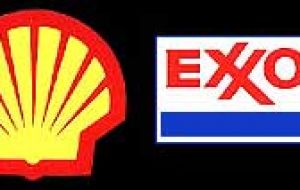MercoPress. South Atlantic News Agency
Exxon follows Shell and is divesting from South America
 “Esso doesn't just want out of Argentina, it wants out of Latin America.”
“Esso doesn't just want out of Argentina, it wants out of Latin America.” Exxon Mobil Corporation seems intent in leaving South America following recent compensation disputes with the Venezuelan government and the decision to sell its Argentine and Uruguayan units, according to some observers in Buenos Aires
Although Exxon Mobil has declined to comment on the matter, Argentine newspapers reported that the company set a deadline for offers for Esso assets that include a refinery and a network of some 500 directly owned and franchised service stations. Esso also owns gas fields in the Argentine provinces of Neuquen and Salta, although they would likely be sold separately, observers said. In Uruguay it was announced that Venezuela's PDVSA was interested in purchasing the over one hundred service stations owned by Esso, information confirmed by government authorities. Just a few months ago Uruguay's government owned oil corporation, Ancap, took over the US oil corporation Texaco service stations, for an estimated 22 million US dollars, and definitively closed its representation in the country. Argentine and Brazilian newspapers reported this week that the plan extends beyond Argentina, with Exxon Mobil looking to also unload assets in Brazil, Uruguay, Paraguay, and Chile. Those reports were in line with comments from an Argentine industry official who said "Esso doesn't just want out of Argentina, it wants out of Latin America." "Shell did the same thing," said another Argentine industry official, referring to Royal Dutch Shell's move, begun three years ago, to sell off refineries and service stations worldwide. Among sales in the region, Shell offloaded service stations in Venezuela and Peru in 2004, selling retail operations in Colombia, Paraguay, and in Uruguay a year later to Brazil's Petrobras. Exxon Mobil decided to leave Venezuela after President Hugo Chavez launched a nationalization campaign earlier this year that would have forced the company to take a minority position in a heavy oil project in the Orinoco River belt. Abandoning Venezuela virtually means leaving South America since the world's fifth oil exporting country necessarily has to be part of the investment package in the region for any large oil and gas corporation. Earlier this month, the company announced that it is seeking international arbitration after compensation talks with the Venezuelan government failed to produce results. Prior to leaving Venezuela, Exxon Mobil sold its 70-some service stations in Peru to Spanish oil company Repsol YPF last year for 35 million US dollars. Media reports in Buenos Aires have speculated with a 200 million US dollars price tag on the Argentine refinery and service station assets, although some industry analysts talk of a 500 million US dollars minimum. According to recent Argentine and Brazilian media reports, Brazil's Petrobras is the top candidate to buy Exxon Mobil's Argentine assets. Newspaper reports suggest that Petrobras wants to bid on all of Exxon Mobil's regional units. Exxon Mobil, and Petrobras officials in Argentina and Brazil preferred not to comment "on any particular opportunities" that might be under consideration at this time. But the road ahead is not simple: even if Exxon Mobil wants to get rid of its Argentine assets quickly, pulling off the deal would require regulatory approval from Argentine President Nestor Kirchner's administration. Argentine media reports this week have suggested that the Kirchner administration wants Petrobras to invest more in Argentine oil exploration and production before it buys fuel retail assets. The price of government approval, say some, would be to have the government's energy firm, Enarsa, brought on as a partner with any eventual buyer. However Enarsa so far is a "paper company" with some two-dozen employees and no real operations. Another candidate for Esso.Mobil assets given the close links between the Kirchner administration and Venezuela's Hugo Chavez could be government owned PDVSA that has a few joint operations with Enarsa. Argentina's retail fuels market is almost entirely supplied by four companies, with Repsol YPF accounting for just over half of supply and Shell, Esso and Petrobras roughly splitting up the remainder. Whatever their global strategies Exxon-Mobil and Shell have been hit hard in their downstream operations in Argentina because of the Kirchner administration policy of keeping energy prices and supply under control, with the cheapest fuel prices in the region, that has forced imports of dearer refined hydrocarbons to be retailed at a loss.




Top Comments
Disclaimer & comment rulesCommenting for this story is now closed.
If you have a Facebook account, become a fan and comment on our Facebook Page!